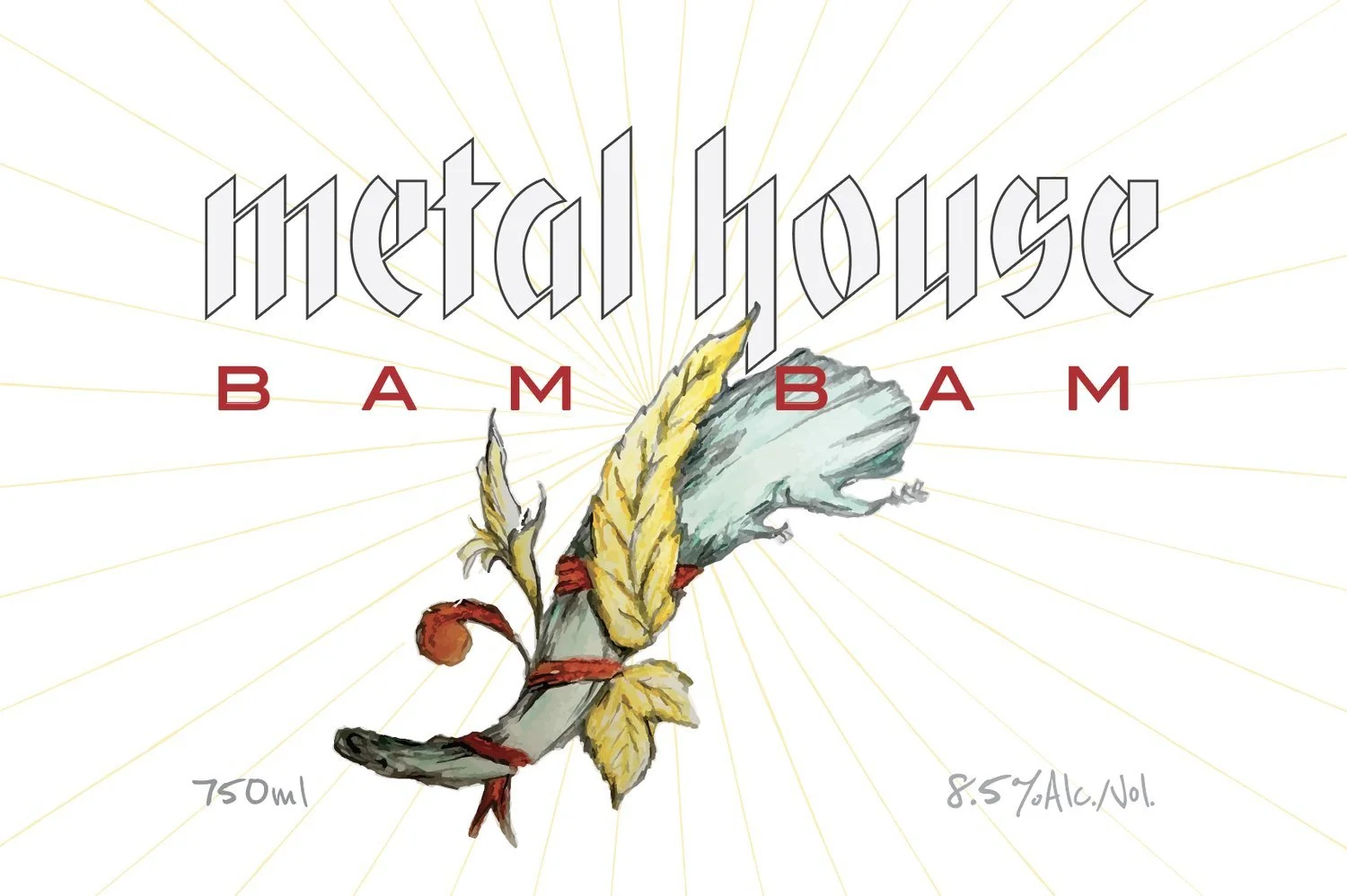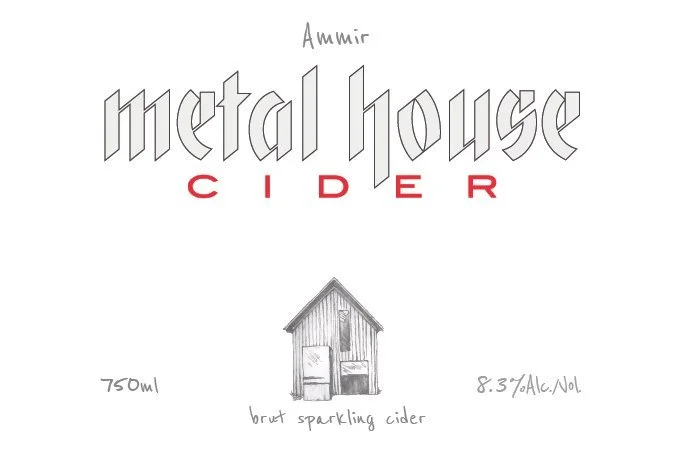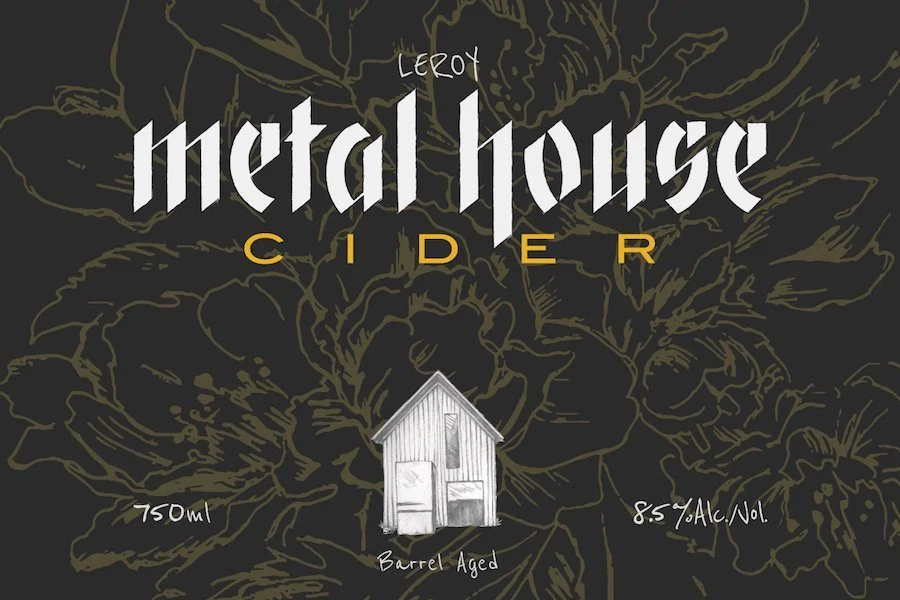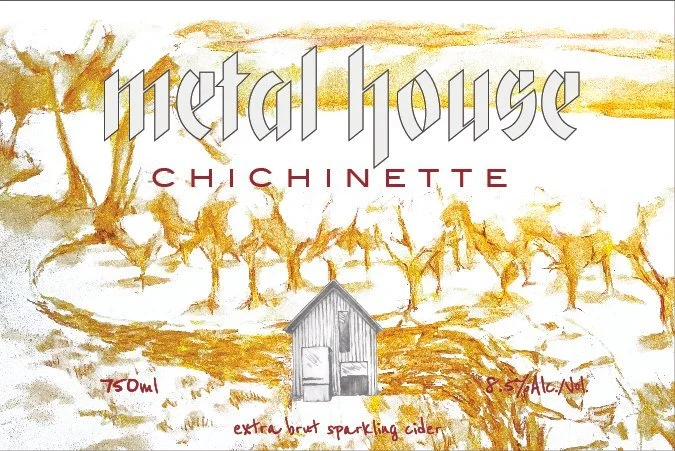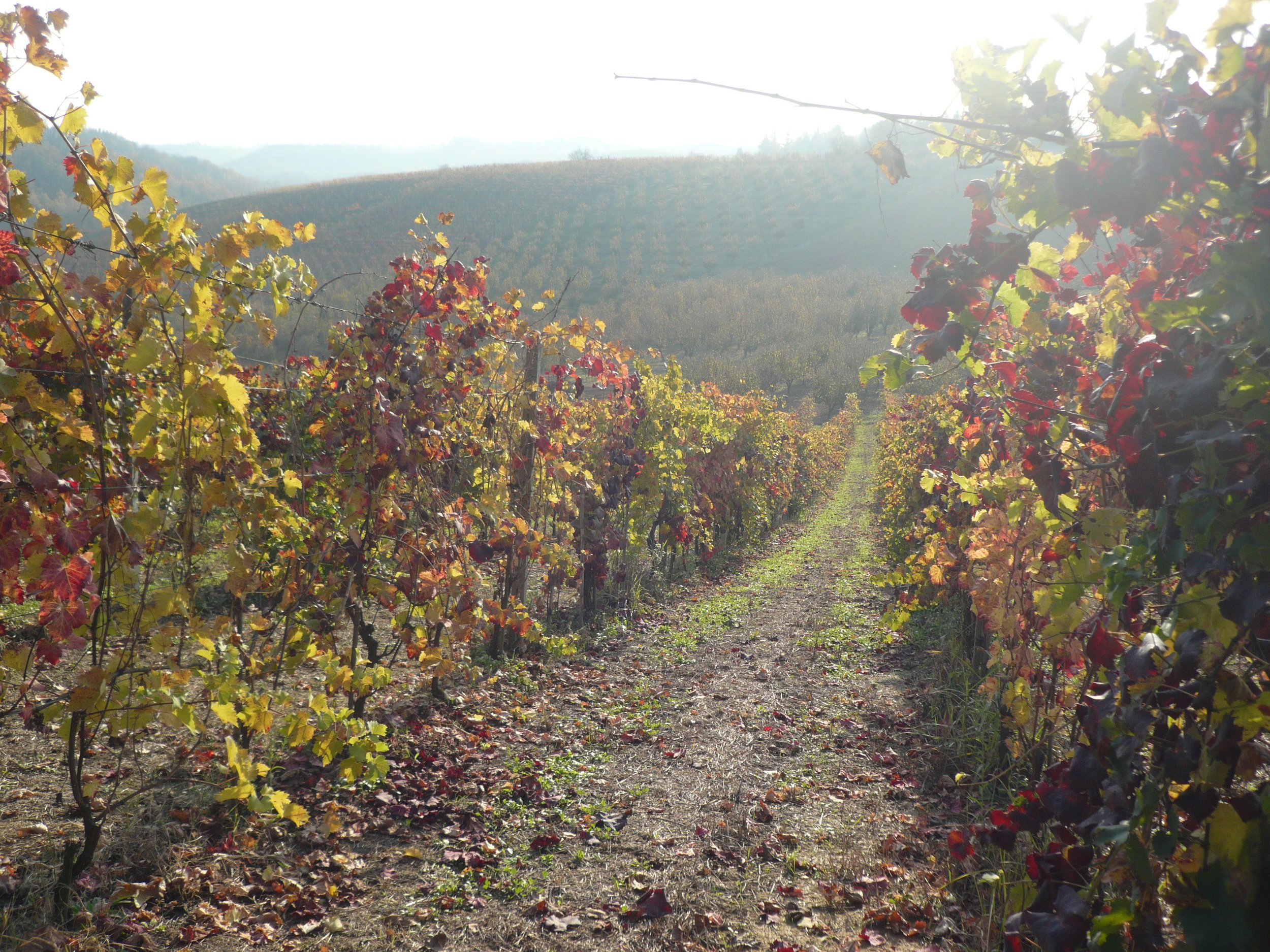
Metal House
New Palz, NY, USA
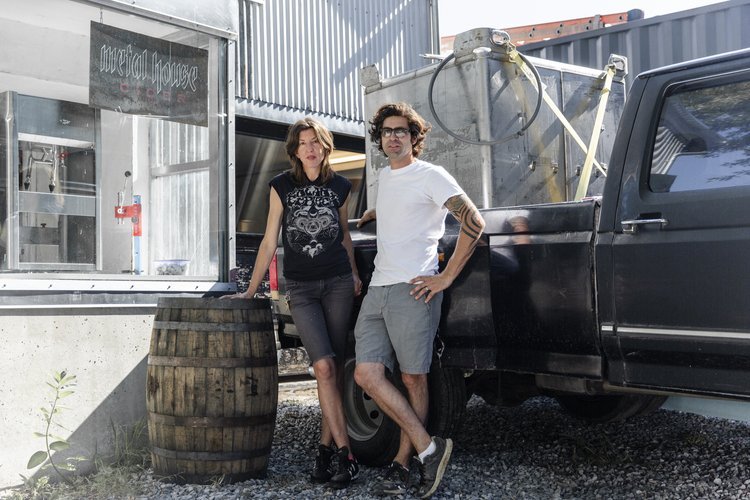
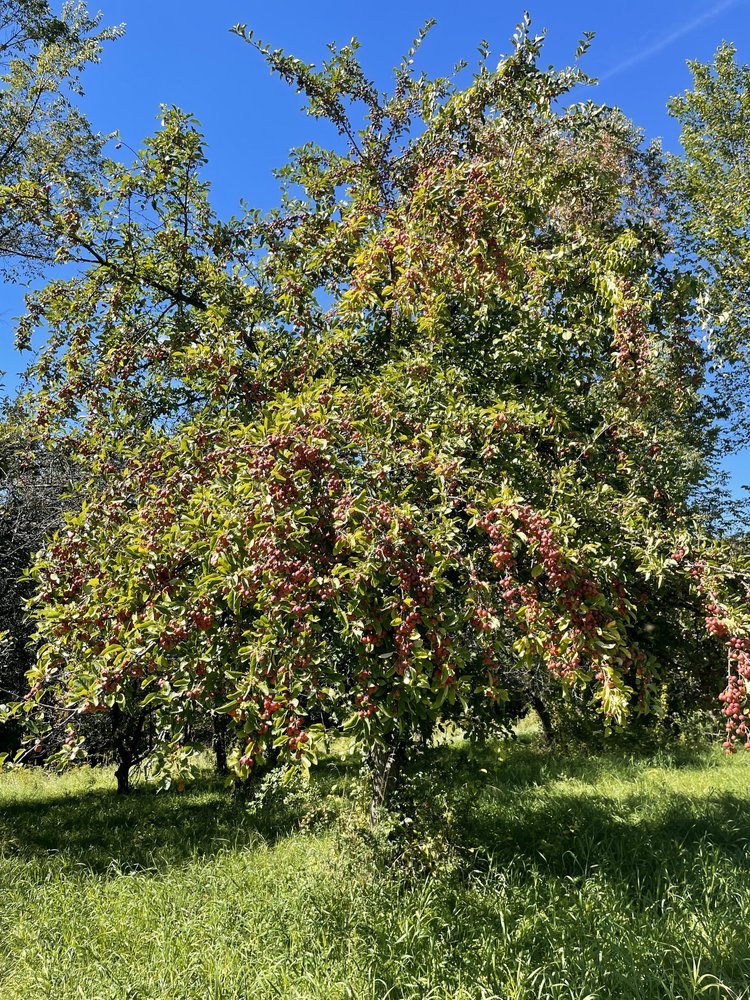

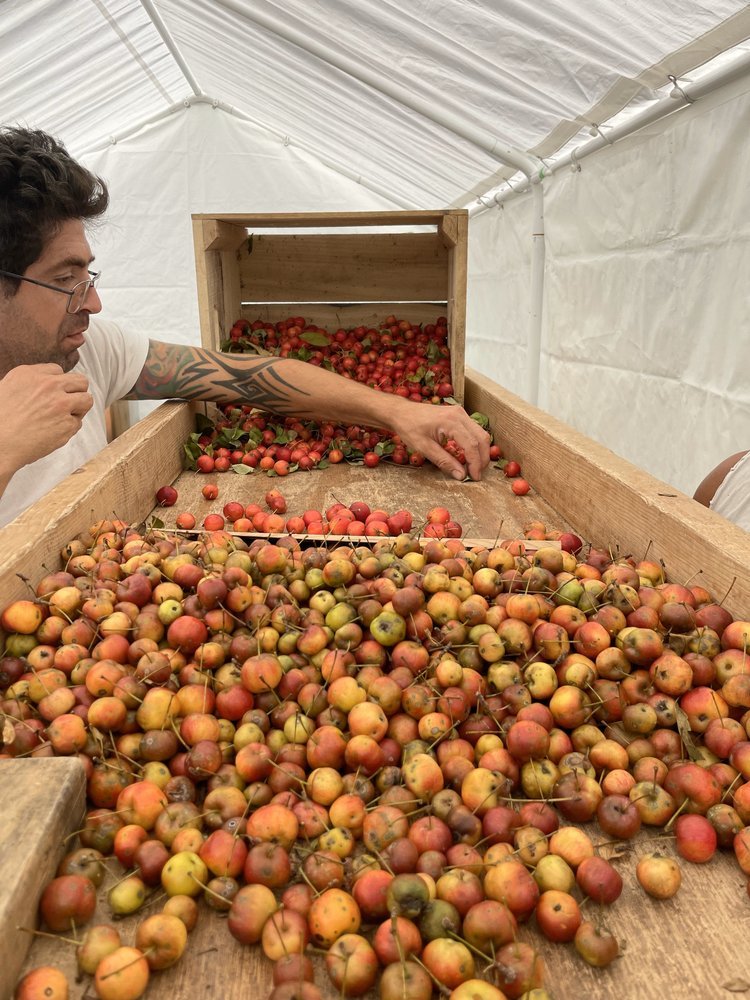
These thrilling ciders are made from heirloom apples – with some sourced from trees that are 80 years and older. The Metal House team employs bio-intensive and biodynamic practices in the orchard, and the selection process is highly intensive. Primary fermentation is generally wild and takes place in stainless vessels, and all ciders – whether full champagne method or undisgorged – rest on the lees in bottle at least 9 months before first release.
The story of Metal House begins long before Kimberly Kae and Matt DiFrancesco landed in Esopus, NY in 2009, and before their son Bruno was big enough to pick apples and help around the cidery. Kim and Matt landed in Esopus eager to get back to the land. Matt was born and raised in an FLX grape-growing family (one of the very few organic growers in the region). Kimberly grew up enjoying the summer wheat harvests in her native Walla Walla, Washington. So, when presented with the opportunity to work with centenarian apple trees right in their new backyard in the Hudson River Valley, the couple jumped at the chance.
What they refer to as their Esopus “home orchard” is planted with historic American heirloom varieties, including Macintosh, Cortland, Rambo and Stayman. They were planted with wide spacing which has allowed them to grow tall, easily reaching 20 feet. By comparison, most commercial orchards are planted with narrow spacing to dwarf trees that may only reach 8 to 10 feet in height. Many of these giants are over 100 years old, still producing quality apples. During harvest, this is the kind of tree that requires a sturdy ladder and great balance. Kim says that even though these are common dessert apples, they are far more interesting than the grocery store versions. Spread out through the same orchard are plenty of “young” Spartan, Empire, Idared, Northern Spy, Jonathan, Tydeman, and Macoun trees, ranging between 40 and 80 years old.
Similarly historic Jonathan trees show up in four blocks of the Esopus orchards and it’s one of their favorites; tangy fruit with high sugar and deep red skins tinging the juice, it is an heirloom from nearby Woodstock discovered in the early 1800s. It is considered a seedling of the Esopus Spitzenburg which originated here around 1790 and is a parent to Jonamac. Kim and Matt share a predilection for rare American heirlooms and new plantings include Esopus Spitz, Newtown Pippin, Rhode Island Greening, Northern Spy, Roxbury Russet, Golden Russet Black Oxford, Blue Pearmain and Baldwin. New American varieties like Goldrush and Redfield have been planted with a handful of bittersweet, sharp European varieties.
So that their trees live to see another hundred years, Kim, Matt, and their long-time orchard manager Leroy employ their own bio-intensive orchard management practices. This combines aspects of biodynamic and organic agriculture, as well as integrated pest management (IPM). Growing companion plants in the orchards and using naturally made fertilizers that work with their specific trees and soils have become major parts of maintaining a healthy ecosystem.
Once the apples start coming through the harvest season, we find ourselves at the eponymous “Metal House” — a corrugated shell of an apple barn for the surrounding orchard, predating the house on the property by decades — which serves as their cidery and cellar.
All apples are hand-picked, and then hand-sorted before processing. The apples go into a funnel grinder then into a seven-layer rack and cloth press that Matt welded together. This occurs just after harvest, sometimes sweating the fruit to achieve higher sugar content. No fruit is saved for processing out of harvest season. Primary fermentation happens in a stainless variable tank or a stainless barrel.
For very small batch runs, usually wild crabs or pears, Kim and Matt use glass demijohns or even carboys. Typically, wild fermentations do best with wild fruit, they say. “We pitch yeast if it is all farmed fruit (or someone else s fruit) however we often try to start things wild and just watch to see how they re coming along and then pitch [yeast] if it seems like a risk. We lost a whole tank once which is such a loss when you’re picking all your own fruit.”
These fermentations go low and slow, often until Christmas and beyond. The ciders are then racked off the gross lees and aged in tank until spring or summer. Second fermentation is kick-started with champagne yeast and the ciders go into bottle immediately. Whether the finished cuvée is made champagne method or undisgorged, all ciders rest on the lees in bottle at least 9 months before first release. The team disgorges in small batches, which means that while some bottles may be released after 9 months, the rest of the bottles may have 24 or even 36 months (!) of aging prior to disgorgement (i.e. 2020 Ammir). Finally, a simple syrup, sometimes honey, is used for dosage.
Ultimately what’s so special about Kim and Matt’s ciders is their ability to tell histories. First is their personal history as a family — the two arrived in Esopus, Kim pregnant with Bruno, and now 15 years later, he's on the bottling line and in the orchard. Then there is the history of their ancient heirloom trees and pre-modern orchards. Ushering these trees into their second century on earth is no easy feat and requires immense respect for the history of the land and the people who came before them. Finally, there is vintage history. It’s rare to find such an elegant and complete line of ciders. Though not entirely surprising given the impact of sur latte aging in champagne, Kim’s vision to employ extended lees aging in the Metal House cellar works some sort of magic. These ciders are electric and alive, with minerality and cut, absolutely built for the long haul. We couldn’t be more excited to bring you four of Metal House’s ciders and help tell their story.
In Spring 2024, the Metal House team was able to purchase an 3rd Generation apple farm in New Paltz and have moved their home and cidery operations from Esopus. They are still managing the orchards north in Esopus but are focusing efforts on this new project, their dream project, of having a farm of their own.
Our Selections
Metal House Bam Bam Sparkling Apple Grape Co-Ferment 2021
“A misbehaving Lambrusco perhaps?” Bam Bam is Metal House’s first foray into the mingling of fruits — one ton of freshly-pressed Cab Franc skins from down the road at Fjord Winery, macerated on top of a windfall of fermenting Jonamac from their Esopus 2021 harvest. This co-fermented for about 10 days before racking. Aged in Ex-Coppersea Spirits oak barrels and bottle-conditioned. Dry, bright ruby in the glass, and ecstatically effervescent.
Metal House Ammir Traditional Method Cider 2020
The “Recently Disgorged” of the lineup, 2020 Ammir spent three years on the lees! Fruit comes entirely from the historic orchards in Esopus grown under Kim and Matt’s holistic management. As they continue to plant cider fruit into that orchard the tenor of Ammir will morph. Dosage with red crab cider. Stone fruit, spicy pepper notes and its signature fine mousse. This is truly a benchmark cider showcasing the potential of traditional method and extended lees aging.
Metal House Leroy Bottle Conditioned Cider 2021
Leroy is a blend of Idared, Cortland, Macoun and Spartan from their Esopus orchards. Fermented in stainless and aged in Rye barrels before being bottle conditioned. This is the one named after their beloved long-time vineyard manager, Leroy. Nuanced spice imprint from the rye-barrels is perfect here, matching a ripe core of fruit.
This cuvee is undisgorged so expect some sediment.
Metal House Chichinette Bottle Conditioned Extra Brut Cider 2020
A translator, a shape-shifter resting high on a wall in plain sight, with bright acidity and a long finish. Sitting just above the Hudson River, this is a block of Northern Spy that revealed itself only after 4 years of pruning. Balanced by some Catskill wild crab and their Esopus blend, Chichinette is a great dinner cider with a long finish and solid acidity. Named after a French spy due to the high percentage of Northern Spy! Bottle conditioned and undisgorged. A Hudson Valley take on col fondo. Lovely.

